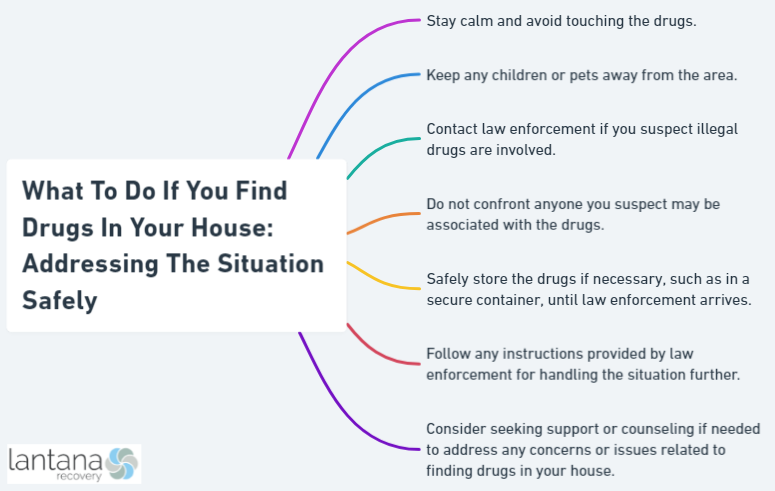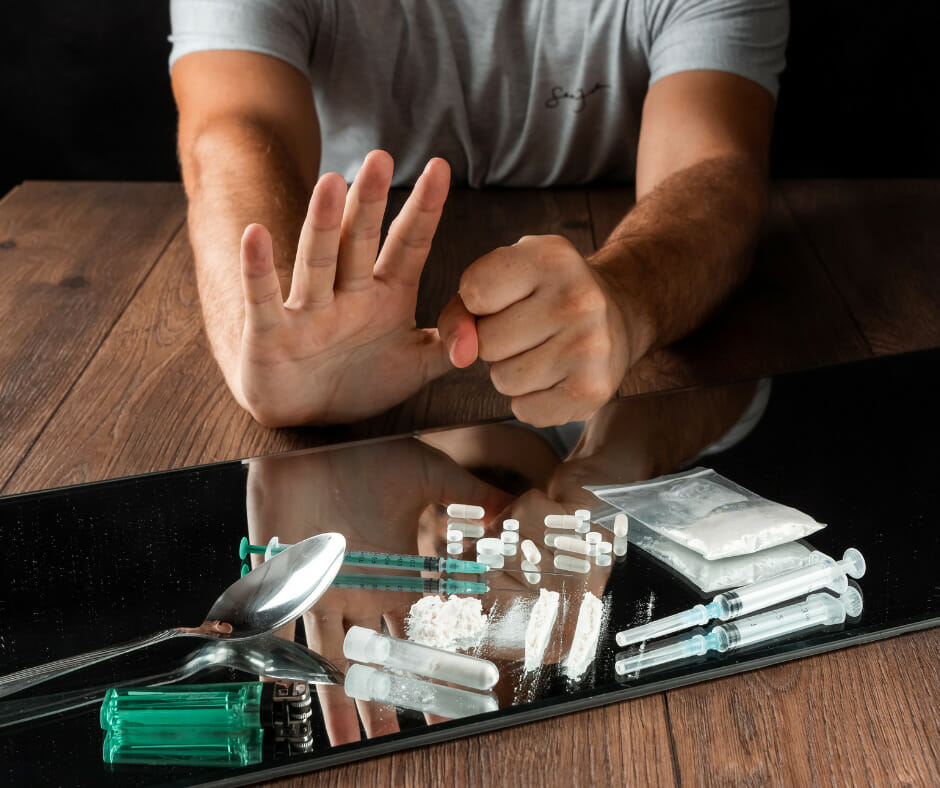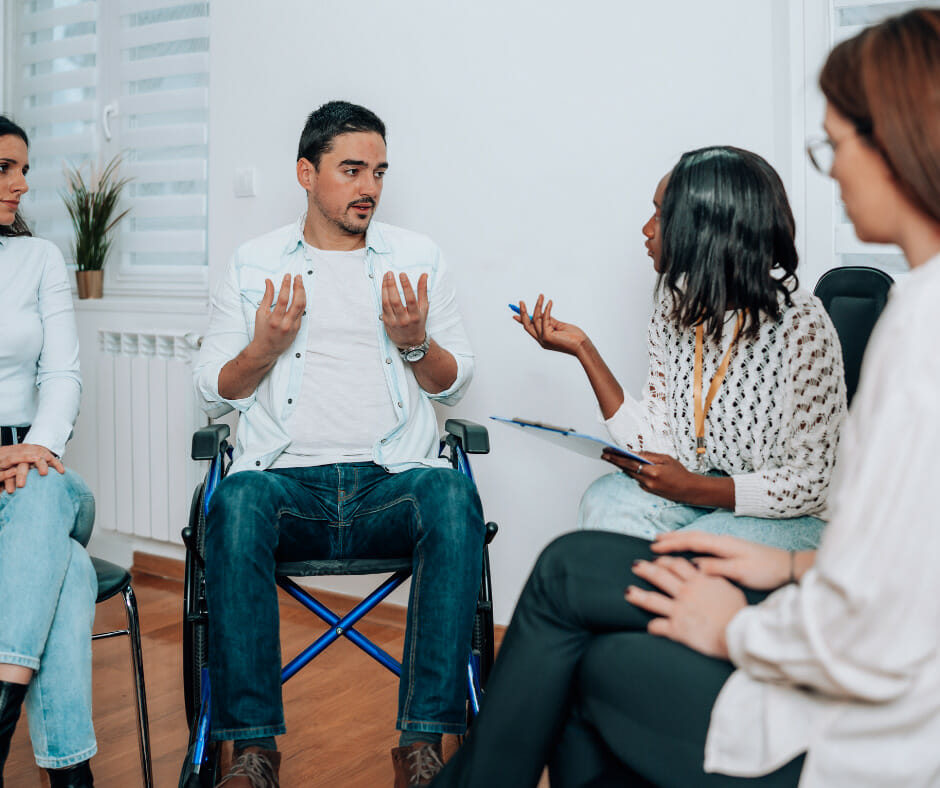When stumbling upon drugs in your house, it can be a shocking and potentially dangerous situation. It’s crucial to know how to address the situation safely and responsibly. Understanding the necessary steps and taking immediate action is key to ensuring your personal safety and resolving the issue properly. This guide provides a comprehensive outline on what to do if you find drugs in your house, including addressing the situation safely, providing support and education, and maintaining a safe environment. Following these steps will help you navigate this challenging situation effectively and protect yourself and your loved ones.
Understanding the Situation: What to Do If You Find Drugs in Your House
When finding drugs in your house, it is crucial to understand the situation. Follow these steps to handle the situation effectively:
- Stay calm and prioritize your safety. Do not touch or disturb any drugs or related items.
- Make sure you are in a safe environment. If you feel threatened or unsafe, leave immediately and contact the authorities.
- If possible, try to identify the drugs without putting yourself in danger.
- Report the situation to law enforcement promptly. Provide them with all the necessary details about the drugs and their location.
- Fully cooperate with investigators by truthfully answering their questions and providing any additional helpful information.
- To prevent further access or accidental exposure, secure the area where the drugs were found. Keep children and pets away from it.
- If you or someone in your household is dealing with substance abuse, seek support from professionals like counselors or addiction specialists.
- Consider taking preventive measures to ensure household safety. This may include installing security systems or educating your family members about the risks of drugs.
- If necessary, address any potential underlying issues that may have contributed to the presence of drugs. Seek professional assistance or support services to effectively deal with these issues.
Make sure you follow these guidelines to handle the situation appropriately and ensure the well-being of yourself and your household.
Taking Immediate Action
When you unexpectedly find drugs in your house, it’s important to take immediate action. Stay calm, assess the situation, and ensure your personal safety. In this section, we’ll discuss the steps you can take to address this alarming situation. From involving the authorities to understanding the potential risks, we’ll guide you through the necessary actions to handle this safely and responsibly. Let’s dive in and tackle this sensitive issue head-on.
1. Stay Calm and Assess the Situation
To address the situation safely when finding drugs in your house, it is crucial to stay calm and assess the situation. Take a moment to breathe and gather your thoughts.
Prioritize personal safety and ensure that others in the house are safe and away from the drugs.
It is important to involve authorities by contacting local law enforcement immediately and informing them of the situation.
Ensure that you document and preserve evidence, if it is safe to do so. You can take photos or videos of the drugs without touching them.
Seek professional help by reaching out to a drug rehabilitation center or substance abuse counselor for guidance and support.
When disposing of drugs, it is vital to follow local guidelines for safe drug disposal. Avoid flushing them down the toilet or throwing them in the trash.
Remember to stay calm and refrain from handling the drugs on your own. Involve the authorities and seek professional help for a safer resolution to the situation.

2. Ensure Personal Safety
When drugs are found in your house, it is important to ensure personal safety by following these steps:
- Assess the situation: Stay calm and carefully evaluate the presence of drugs.
- Take protective measures: Put on gloves and other necessary protective gear to avoid direct contact with the drugs.
- Secure the area: Keep uninvolved people away from the location where the drugs are found.
- Avoid touching or moving the drugs: Refrain from tampering with or disturbing the drugs as they can be hazardous.
- Avoid inhaling fumes: If drugs are being smoked or producing fumes, make sure there is proper ventilation and minimize exposure.
- Isolate and contain: If possible, place the drugs in a safe and secure container to prevent accidental contact or ingestion.
- Call for professional help: Contact the authorities or a local drug enforcement agency to report the discovery and seek guidance.
- Cooperate with authorities: Provide any information or details about the drugs to assist in their investigation.
It is crucial to prioritize personal safety in these situations. By taking these steps, you can help ensure your well-being and the safety of others involved. It is important to seek professional advice and follow their instructions to address the situation safely.
3. Involve Authorities
When drugs are found in your house, it is crucial to involve the authorities. Follow these steps:
- Immediately call the local police department or emergency services. Inform them about the discovery of drugs and provide accurate and detailed information.
- Fully cooperate with the authorities when they arrive. Provide any requested information, including the type and location of the drugs.
- Follow the instructions given by the trained professionals from the authorities, who will guide you on appropriate actions.
- If necessary, allow the authorities to conduct a thorough search of your premises to gather evidence.
Involving authorities is essential for a safe and effective resolution. By taking these steps, you actively combat the presence of drugs in your house and protect your community. Remember, the authorities are there to assist you in handling this challenging situation.
If you suspect someone in your house is abusing drugs, here is a complete guide on how to tell if someone is on drugs.
Addressing the Situation Safely

When it comes to addressing the situation safely after finding drugs in your house, there are three crucial steps you need to take.
- First, documenting and preserving evidence is essential for legal and safety purposes.
- Next, seeking professional help can provide the guidance and support needed to handle the situation effectively.
- Lastly, proper disposal of drugs is necessary to ensure the safety of everyone involved.
Let’s dive deeper into each sub-section to understand the best course of action in this challenging scenario. Remember, taking proactive measures is key to dealing with this situation safely.
1. Document and Preserve Evidence
Documenting and preserving evidence is vital when it comes to finding drugs in your house. To ensure a proper resolution, follow these steps to effectively document and preserve evidence:
- Take clear and detailed photographs of the drugs and their location in your house using your phone or camera.
- Avoid direct contact with the drugs to prevent contamination and potential harm. Use gloves or any available protective equipment.
- Secure the room or area where the drugs were found to maintain the integrity of the evidence. If possible, lock the doors to limit access.
- Write detailed notes, including the date, time, and specific location where the drugs were discovered. Include any other relevant details.
- Preserve any packaging as evidence if the drugs were found in it. Place it in a plastic bag and seal it.
Preserving evidence plays a crucial role in aiding law enforcement in their investigation and prosecution processes. By properly documenting and preserving evidence, you contribute to creating a safer environment for yourself and your community.
2. Seek Professional Help
Seeking professional help is crucial if drugs are found in your house. Involve experts who can guide you through addressing the situation safely and effectively.
- Consult a Substance Abuse Professional: Reach out to a counselor or therapist who specializes in addiction. They can provide necessary guidance and support.
- Contact Law Enforcement: Notify the authorities about the presence of drugs in your house. They have the expertise and resources to handle the situation safely.
- Get in Touch with a Rehab Facility: If you suspect someone in your house is struggling with drug addiction, contact a reputable rehab facility. They can assist with treatment and support.
- Inform Your Healthcare Provider: Discuss the situation with your healthcare provider. They can offer advice, resources, and referrals.
Seeking professional help is essential for everyone’s safety and well-being. Experts can guide you through the necessary steps effectively and provide support during challenges.
Fact: : According to SAMHSA’s 2020 National Survey on Drug Use and Health, an estimated 10.8 million adults in the US had a substance use disorder in 2020, emphasizing the importance of seeking professional help in these situations.
3. Dispose of Drugs Properly
Proper drug disposal is crucial to ensure safety and prevent misuse. To dispose of drugs properly, follow these steps:
- Identify the drugs: It is important to determine the type and quantity of drugs that need to be safely disposed of. Handle each drug appropriately.
- Read the packaging: Always check the packaging for specific instructions on how to dispose of the drug.
- Consult a pharmacist or healthcare professional: If you are unsure about the proper disposal methods for a specific drug, seek guidance from a pharmacist or healthcare professional.
- Do not flush drugs: Flushing drugs down the toilet or sink can contaminate water sources. Avoid this method of disposal.
- Use a drug take-back program: Look for local programs that offer safe disposal options for drugs. These programs provide a convenient and responsible way to dispose of medications.
- Use a drug disposal pouch: Some pharmacies or organizations provide special pouches that deactivate drugs, allowing for safe disposal in the regular trash.
- Secure packaging: When disposing of drugs in the regular trash, make sure to securely package them to prevent accidental exposure or ingestion.
- Remove personal information: Before disposing of drug packaging, remove any personal information to protect your privacy.
- Dispose of in household trash: If no other disposal options are available, place the drugs in a sealed container or bag and dispose of them in your household trash.
Proper drug disposal plays a vital role in preventing misuse and accidental ingestion. By following these steps, you can contribute to creating a safer environment for yourself and your community.

Providing Support and Education
When it comes to addressing the situation of finding drugs in your house, providing support and education is key. In this section, we’ll dive into the ways you can seek counseling and support services, guiding you towards the resources that can assist you during this challenging time. Additionally, we’ll explore the importance of educating yourself and others, equipping you with the knowledge necessary to handle this situation safely. It’s time to empower yourself and take control of the circumstances.
1. Seek Counseling and Support Services
If you find drugs in your house, it is important to seek counseling and support services for your well-being. Here’s what you can do to address the situation:
-
Reach out to a counselor or therapist who specializes in substance abuse. They can provide guidance and support to help you navigate this challenging time.
-
Contact local organizations that assist individuals and families affected by drug addiction. These resources can provide you with additional support and connect you with a network of others who have similar experiences.
-
Consider joining a support group specifically designed for family members dealing with drug addiction. This can be a valuable opportunity to share your experiences, receive emotional support, and learn new coping strategies.
-
Attend individual counseling sessions to address the emotional and psychological effects of discovering drugs in your house. By working with a counselor, you can process your feelings and develop healthy ways to cope with the situation.
-
Look for counseling services that cater to teenagers or children in your household who may be affected by this situation. It is crucial to provide them with the support they need during this challenging time.
-
Encourage other family members who are struggling to seek help and offer your support throughout their healing process.
By seeking counseling and support services, you will receive the guidance and assistance you need as you navigate the path to recovery. Remember, you are not alone, and there are professionals and support networks available to help you through this challenging time.
2. Educate Yourself and Others
Educating yourself and others about drugs found in your house is of utmost importance. Here are some key points to keep in mind:
- Acquire knowledge about the drugs: Take the time to educate yourself about the specific drugs, including their associated risks, potential side effects, and addictive properties. This knowledge will enable you to effectively communicate the seriousness of the situation.
- Share vital information with family members: Have an open and honest discussion with your family members. Inform them about the drugs that have been discovered, emphasizing the dangers involved and the need for immediate action.
- Provide reliable resources: Find trustworthy sources, such as government websites or organizations focused on drug abuse prevention, which can be shared with your family and others. These resources will help everyone grasp the risks associated with drug use, identify signs of addiction, and become aware of the available support.
- Be a source of support: Offer support to those affected by the drugs that have been found. Encourage open communication and assure them that seeking help is crucial and nothing to be ashamed of.
- Seek guidance from professionals: Get in touch with local substance abuse helplines or addiction specialists who can provide guidance and resources. They are well-equipped to advise you on how to approach the situation and can connect you to appropriate treatment or counseling services.
Remember, educating yourself and others about drugs is crucial when it comes to addressing the situation safely and effectively. By sharing your knowledge and seeking professional assistance, you can create a supportive environment that promotes recovery and prevention.

Maintaining a Safe Environment
Maintaining a safe environment is crucial when it comes to addressing the presence of drugs in your house. In this section, we will explore effective strategies that can help create a secure living space. From implementing necessary security measures to staying vigilant and practicing open communication, we’ll provide you with valuable insights on how to protect yourself and your loved ones. Let’s dive into the essential steps you can take to ensure a secure and drug-free home.
1. Implement Security Measures
Implementing security measures is vital when it comes to drug discovery in your home. These measures are essential in ensuring the safety of everyone involved and preventing any further harm. Here are a few steps you can follow to successfully implement these security measures:
- Begin by assessing the current security situation within your home. This will help you identify any vulnerabilities or weaknesses that may have contributed to the presence of drugs.
- Strengthen the physical security of your home by installing high-quality locks on all doors and windows. Additionally, you may want to consider the installation of security cameras or alarm systems for added protection.
- Establish access control measures by limiting entry points. To enhance security, consider utilizing keypad or biometric locks for restricted access.
- Take the time to secure potential areas where drugs may be concealed or hidden. This includes checking under furniture, within wall cavities, and even inside electrical outlets.
- Communication plays a crucial role, so it’s important to establish clear boundaries with all members of your household. By doing so, you create a safe environment that is free from drugs.
- Properly secure any drugs or suspicious items that you come across. If you suspect the presence of drugs or find any, it is essential to contact the appropriate authorities without handling them yourself.
- Regularly educate yourself and your household members about the dangers of drugs and effective prevention methods.
By implementing these necessary security measures, you will be able to safeguard your home and protect your loved ones from any drug-related risks.
Let me share a true story to further emphasize the importance of implementing security measures. Mary, a mother of three, discovered drugs hidden in her teenage daughter’s room. She wasted no time in taking action and implemented various security measures such as reinforcing doors and windows, installing security cameras, and participating in drug awareness programs. By proactively addressing the situation, Mary ensured the safety of her family and helped her daughter overcome drug addiction with the support of professional counseling services. Together, they successfully created a secure, drug-free home environment.
2. Regularly Monitor the House
Regularly monitoring the house ensures the safety and well-being of everyone. Proactively keep an eye on the premises to detect potential drug-related activities or signs of illegal substances. Here are some steps you can take to regularly monitor your house:
- Set up security cameras: Install cameras in strategic locations to regularly monitor entrances, windows, and vulnerable areas for suspicious activity.
- Conduct regular checks: Thoroughly check the house indoors and outdoors on a regular basis for signs of drug paraphernalia, unusual odors, or hiding spots. Pay attention to common areas, bedrooms, and areas with limited visibility.
- Involve trusted individuals: If you can’t personally monitor the house yourself, ask friends, family, or neighbors to regularly check on the property. Communicate your concerns and provide them with instructions on what to look out for.
- Encourage open communication: Establish a safe and non-judgmental environment for household members to regularly share concerns or observations about potential drug activity.
- Stay informed: Stay updated with local news and information about drug trends and criminal activities in your area. This knowledge helps you be more vigilant and aware of potential risks.
Regularly monitoring your house is crucial in preventing and detecting drug-related issues. According to a study published in the Journal of Drug of Education, “Most parents had prescription drugs in the house, but took few precautions against teens accessing these drugs.” (How Parents of Teens Store and Monitor Prescription Drugs in the Home, Friese, 2014)
3. Stay Vigilant and Practice Open Communication
To address drugs found in your house safely, it is important to stay vigilant and practice open communication. Here are the steps you can take:
- Create a safe and supportive environment: Ensure that everyone in the house feels comfortable sharing their thoughts and concerns. Foster trust and support among family members or housemates.
- Encourage open dialogue: Promote honest and open communication about the situation. Encourage family members or housemates to openly share their feelings, concerns, or any information they may have.
- Listen actively: Show attentiveness and understanding when others share their thoughts and experiences. Validate their emotions and let them know they are being heard.
- Maintain regular conversations: Make it a habit to have regular check-ins with family members or housemates to keep the lines of communication open. This will help everyone feel heard and supported.
- Seek professional help: If needed, involve a counselor or therapist to facilitate productive discussions and provide guidance on effective communication and coping strategies.
- Educate yourself and others: Stay informed about the dangers of drug abuse. This knowledge will empower you to have informed discussions and make better decisions.
- Establish boundaries and consequences: Have a discussion with family members or housemates about setting clear boundaries regarding drugs in the house. Clearly communicate the consequences for violating these boundaries and ensure they are enforced.
Remember, by staying vigilant and practicing open communication, you can create a supportive environment where everyone can work together to address the situation safely and find the necessary help and support. Did you know that open communication and support from loved ones play a crucial role in helping individuals overcome drug addiction.
Frequently Asked Questions
What should I do if I find drugs in my house?
If you find drugs in your house, it is important to stay calm and think before acting. Take a few days to research the drug and its risks before confronting the person who the drugs belong to. Seek advice from trusted sources like family members and doctors on how to handle the situation.
What are some common hiding places for drugs?
Drugs can be hidden in various places in the house. Some common hiding places include mattresses, appliances, furniture, ceiling tiles, shoes, and cars. It is important to thoroughly search these areas if you suspect someone is keeping drugs in your house.
How can I identify different types of drugs?
Visual identifiers can help you understand what type of drug you have found. Cocaine is a white, crystalline powder, while LSD is often added to absorbent paper. MDMA comes in white or gray crystals, and heroin is a fine, white powder when pure. Prescription pills can be identified using a pill identification tool.
How should I confront the person who the drugs belong to?
When talking to the person, remind them that you care for them and inform them of the risks they are taking. Avoid lecturing and explain the consequences of their actions. Make it clear that drugs will no longer be allowed in the house. Listen to the person’s explanation for their behavior and have a productive, two-way conversation.
What should I do if the person denies the drugs are theirs?
If the person denies that the drugs belong to them, explain the consequences and your expectations. Consider professional intervention services to address the situation. It is important to seek help and support from knowledgeable third parties like addiction treatment centers or hotlines.
What are some treatment options for addressing a substance abuse problem?
If evidence of a substance abuse issue is found, there are various treatment options available. These include therapy, support groups, rehabilitation programs, inpatient or residential programs, outpatient therapies, 12-step meetings, case management, and relapse prevention. Lantana Recovery, outpatient rehab in Greenville offers help for addiction and can provide information about intervention, treatment, and recovery.









